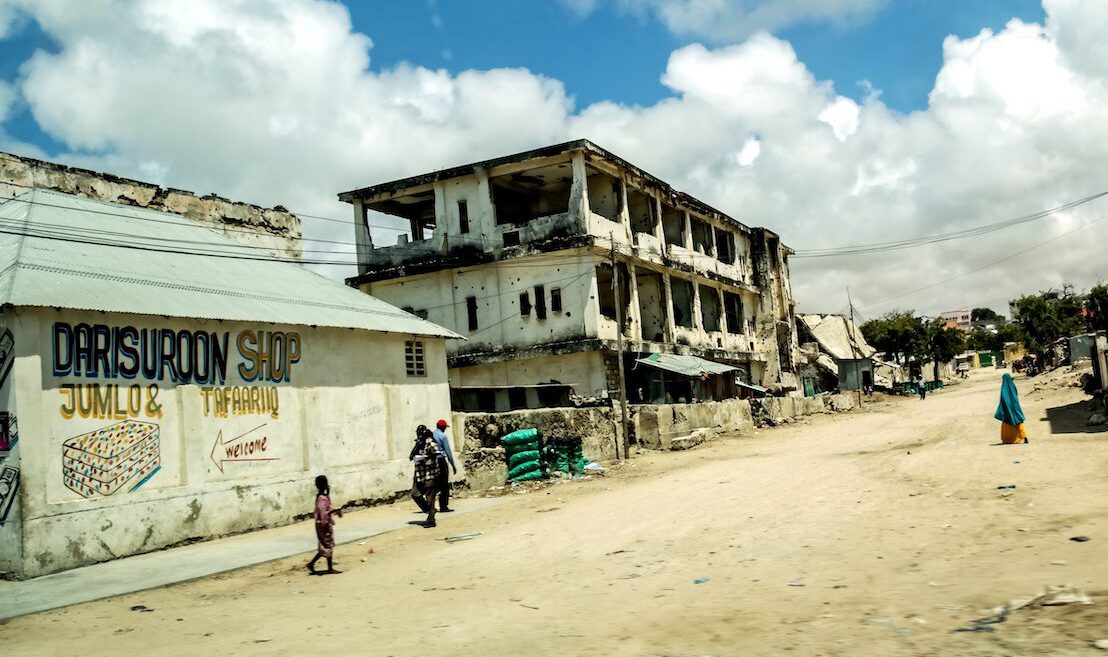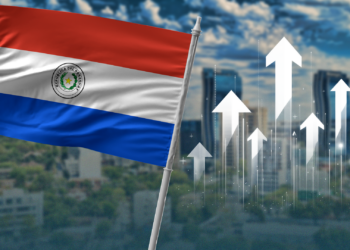Despite U.S. Aid, Somalia’s Government Is as Weak as Ever
Al-Shabaab has begun to encircle the capital.

Since February, the terrorist group al-Shabaab has been on the offensive in Somalia, with many fearing that they aim to take Mogadishu, the capital. Following a 2022 government offensive in the middle part of the country, the situation stabilized and the group was believed to be greatly weakened—but not for long.
In the time since, the government has become involved in significant disputes about changing the constitution. The controversies have led to a falling out between Mogadishu and the regional governments of Puntland in the north and Jubaland in the south, leaving the Somali National Army and allied militias without support from the armed forces of key regions. Al-Shabaab has captured significant territory since the ongoing offensive began, though no one can agree on how much and they have moved in and out of many territories without attempting to hold them.
Last month al-Shabaab attacked President Hassan Sheikh Mohamud’s convoy within a mile of Villa Somalia, the presidential palace. The onslaught killed four, though the president himself escaped unscathed.
Meanwhile, the U.S., Europe, and their African partners seem to be tiring of their commitment to the perpetually troubled state and may let Turkey take over. If that happens, Ankara would become the latest in the merry-go-round of foreign occupiers in Somalia.
The origins of Al-Shabaab, Somalia’s Al Qaeda affiliate, date back around 20 years. Following the fall in 1991 of the Barre government, Islamists filled the power vacuum and began to bring order to the country, setting up Sharia courts and promoting an ideology that many young men found attractive. They consolidated power in 2006 after chasing the “warlord” coalition out of Mogadishu.
However, Ethiopia invaded shortly thereafter, backed by the United States, and threw the Islamic Courts Union out of power. Ethiopia occupied the country for three years, establishing the Transitional Federal Government, which became the Federal Government of Somalia, such as it is, that we have today. Al-Shabaab, which means “the youth” in Arabic, was a youth militia of the Islamic Courts Union which took a leading role in the insurgency against Ethiopia and its transitional government, ultimately pledging loyalty to Al Qaeda in 2012.
Somalia fell into the pattern of weak states that are international wards, similar to Afghanistan. The federal government has maintained limited control, mostly in the capital, while the state is seriously challenged by terrorists who hold a large amount of territory.
It is hard to know how many dollars in U.S. aid Somalia has received, but according to Elias Yousif of the Stimson Center, in the 2010s it was around $3 billion: $2.5 billion to the African Union Mission in Somalia and $500 million directly to the national army. A 2019 Washington Post article states that in the preceding year Somalia received $441 million from USAID as its standard aid package.
Somalia is commonly rated the world’s most corrupt country by Transparency International, though South Sudan overtook it in the 2024 index. The American taxpayer would not be pleased to learn about the nature of U.S. aid to Somalia. Various funding programs have been repeatedly stopped and restarted over corruption concerns. Moreover, by some accounts over a third of Somalia’s legislators are dual citizens, many less interested in governing than keeping money flowing from their second country, who come back to Somalia for “tours” in parliament, the way someone else might go to Africa for humanitarian work.
Obviously, foreign aid hasn’t bought a stable government in Mogadishu, much less one which has ever come close to controlling all of internationally recognized Somalia. However, that isn’t to say there have been no improvements, and Somalia has had something resembling a real government for over a decade. But Somalia’s infamous clan system has made democracy difficult. By African standards, the country is remarkably uniform in terms of nationality, language, and religion. Still, the government had to adopt something similar to Lebanon’s sectarian constitution, distributing political power between the clans.
Mohamud has been trying to push through a reformed constitution and “one person, one vote” elections since coming to power, a source of endless strife within the federal government. In response to Mohamud’s efforts, Puntland, which unilaterally declared internal autonomy in the ‘90s, withdrew recognition from the federal government. Meanwhile, Jubaland changed its constitution, in violation of federal law, to allow its regional president to be elected to a third term, leading to a dispute that also saw Jubaland break off relations with the federal government. The latter development sparked at least one gun battle in which the national army came off worse than Jubaland forces.
Despite all of these problems, the Somali National Army and “local militias” known as Macawisleey started a reasonably successful offensive against Al-Shabaab. Backed by U.S. airstrikes, it went well for a while, and the government continued to report as late February that Al-Shabaab was on its last legs. However, the tide turned, and Somalia began to lose villages to the terrorist group, which also besieged a hotel that was holding a meeting on counter-terror strategy. The militants have taken several villages and cities in the central Shabelle region, though people disagree on how many, in a counter-offensive seen by many as an effort to surround Mogadishu. The brazen attack on the president’s convoy demonstrated military capacity and an ability to operate in the immediate vicinity of territory controlled by the Mogadishu government.
There is currently no way to know if Mogadishu will hold, and analysts disagree on the extent of the threat. Matt Bryden at Sahan Research Group, which is generally seen as fairly favorable to Western governments and critical of Mogadishu, said “there’s a chance of al-Shabaab fully encircling or possibly even at one stage overrunning the city,” while Omar Mahmood of the International Crisis Group doubted that Al-Shaabab would march to the capital.
Bryden’s analysis is proving more accurate. Al-Shabaab indeed has marched towards Mogadishu—by some reports reaching within 20 kilometers of the city—and the situation has grown desperate enough that the Somali government has deployed untrained prison guards to fight them. In a BBC interview, Bryden speculated that Al-Shabaab aims for a psychological blow by convincing the populace Mogadishu could fall. But the group may not want to achieve much beyond that—yet. Bryden noted that Al-Shabaab collects enormous tax revenue, perhaps $100 million annually or more, and thus benefits from the continuation of some semblance of political stability. But as the government grows weaker and Al-Shabaab stronger, the latter may soon decide it’s time to strike. As explained by security analyst Adam Duad Ahmed in a recent op-ed, Al-Shabaab has developed parallel governance structures across Somalia, something that the Mogadishu government’s boosters downplay at their own peril, as this means they may be ready to rule Somalia, just as jihadists took over Damascus last December and became the Syrian state.
Across Somalia’s ever-divided political spectrum, there were calls for Mohamud to unite the clans to protect the capital and turn back the tide. Initially, he seemed reluctant to do so, but at the end of March he relented, announcing the intention to hold a conference and seemingly giving up on his divisive constitutional reforms. Mohamud is also working hard to bring yet more foreign troops to Somalia, and he seems to be nearing a defense agreement with Turkey. On the other hand, he made the bizarre move of offering the U.S. control of ports in Puntland and Somaliland—neither of which Mogadishu controls—in hopes of averting possible U.S. recognition of the independence of Somaliland, a de facto state that is currently recognized as part of Somalia under international law. Mohamud’s action seems to demonstrate that he remains too focused on infighting to confront the imminent threat to Mogadishu.
While the situation remains fluid, one thing is clear: After decades of international financial and military support, the Mogadishu government is no closer to asserting control over a unified Somalia.
The post Despite U.S. Aid, Somalia’s Government Is as Weak as Ever appeared first on The American Conservative.







